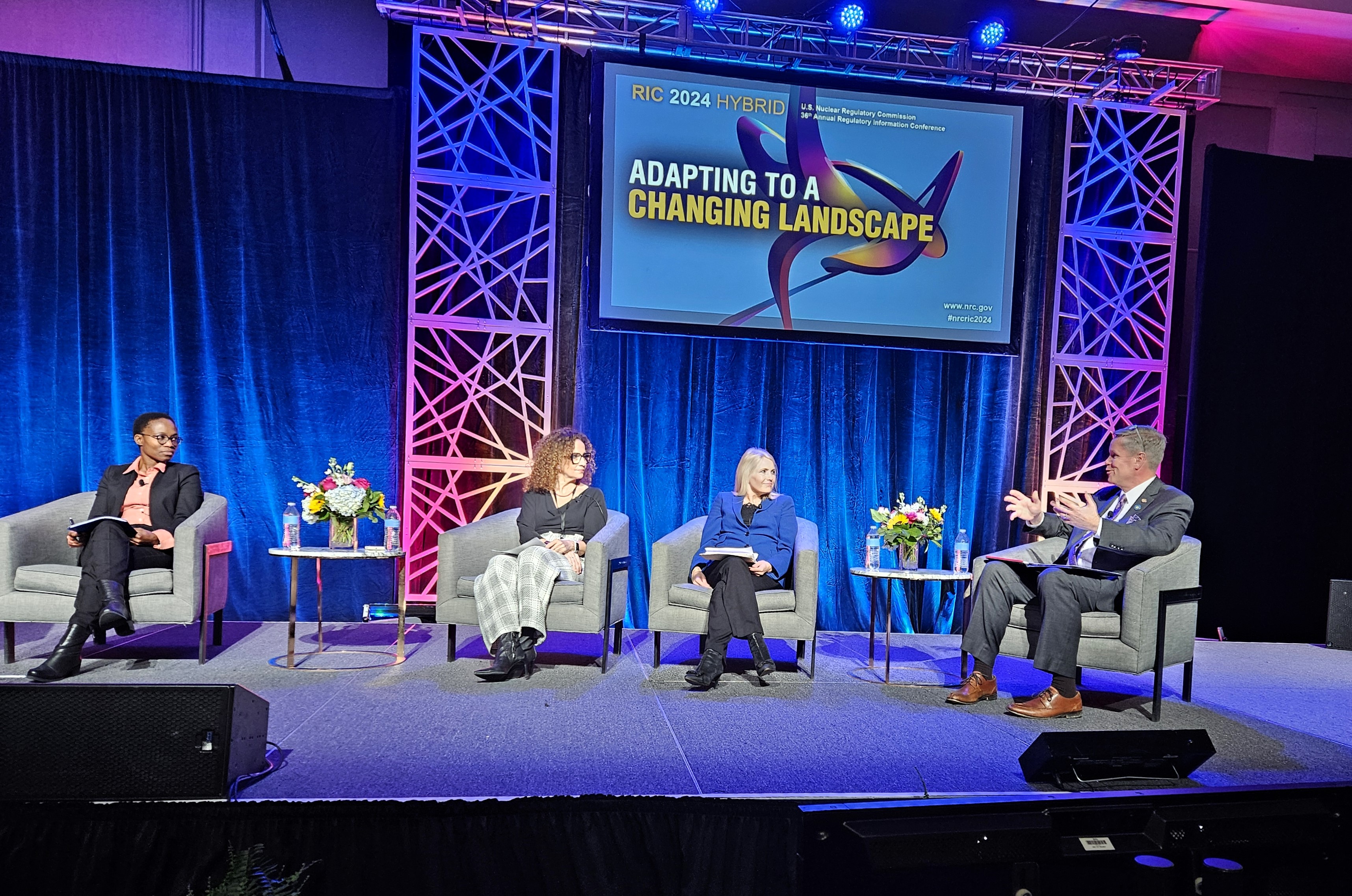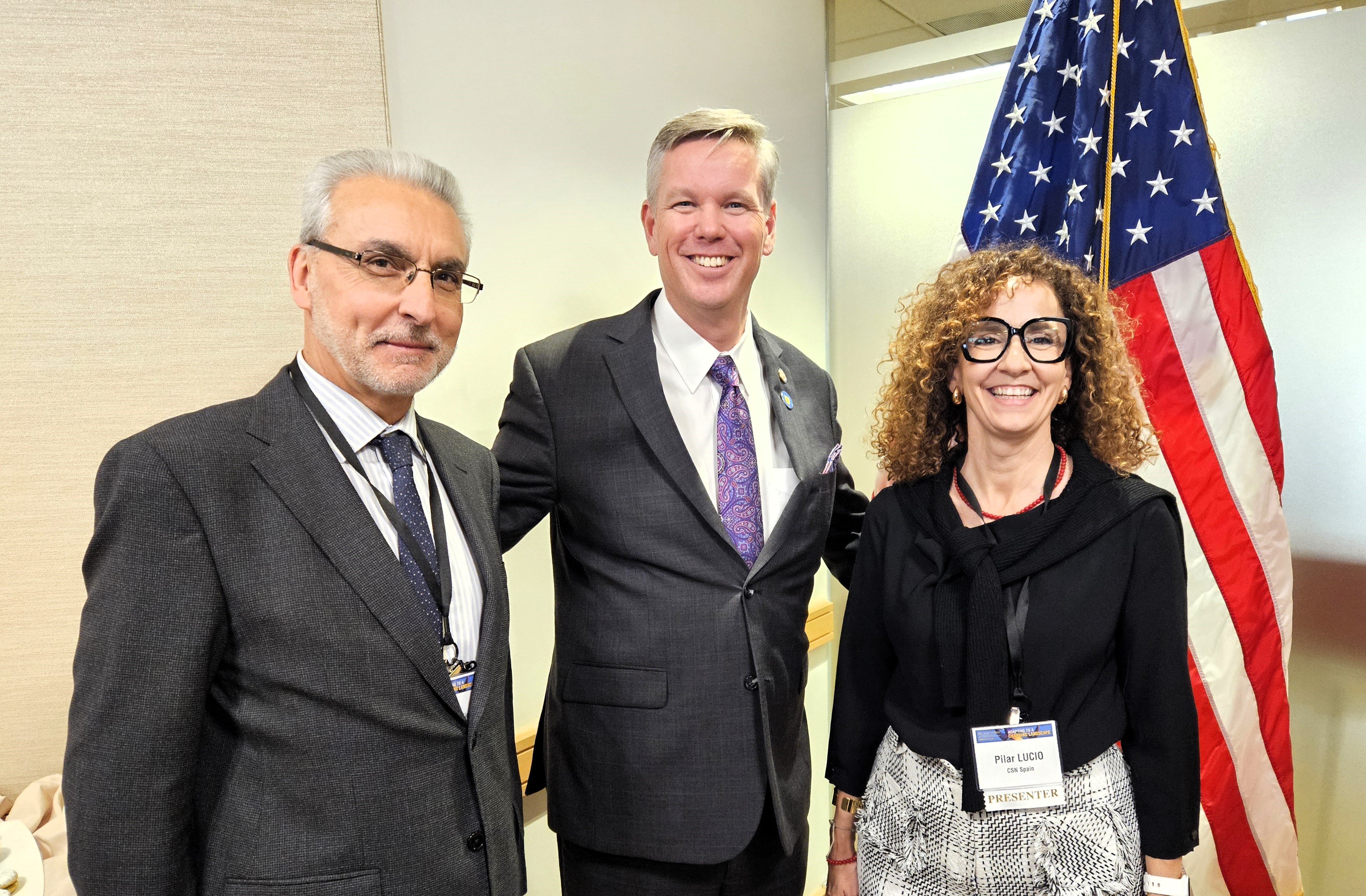Contenido principal
2024
The Spanish Nuclear Safety Council participates at the 36th Regulatory Information Conference in Washington
During one special plenary session, Commissioner Pilar Lucio stresses the importance of implementing practices that promote gender equality in the sector.
The conference constitutes a first-level international forum for information and regulatory experience exchange

Commissioner Pilar Lucio participated in the plenary session “Agents of change: building a path towards gender equality”
The Spanish Nuclear Safety Council (CSN) has participated in the 36th Regulatory Information Conference (RIC) held in Washington, D.C. from March 12 to 14. A CSN delegation headed by its president, Juan Carlos Lentijo and commissioner Pilar Lucio along with the deputy director of nuclear facilities, Cristina Les, attended the event, organised by the U.S. Nuclear Regulatory Commission (NRC). The conference is a first-level international forum for the exchange of information and experiences among regulators, operators, and other stakeholders. This year's edition brought together more than 3,000 participants from 50 countries, according to the organisers.
Commissioner Pilar Lucio participated in a special plenary session entitled "Agents of Change: Building a Path towards Gender Equality." She emphasized, along with representatives from other regulators and international institutions, the need to increase the number of women pursuing university studies in Science, Technology, Engineering, and Mathematics (STEM).
Lucio, an active member of the OECD Nuclear Energy Agency (NEA) High-Level Group on Gender Balance in the Nuclear Sector (HLG-GB), referred to the 2023 NEA international survey on gender balance in the nuclear sector. The survey demonstrates that there is a structural problem and that specific policies needed to address it. Lucio also highlighted the importance of promoting STEM among girls from an early age and promoting women role models to be followed in all scientific and technical fields.
Lucio explained the Spanish regulator's commitment in this area with the approval of its first Gender Equality Plan in 2023. The plan contemplates the creation of policies and practices that promote gender equality through concrete actions. The commitment of senior officials participating in international groups such as the International Gender Champions’ Impact Group of the International Atomic Energy Agency (IAEA) and the CSN's adherence to the "STEM Alliance for Female Talent, Girls in Science”, an initiative of the Ministry of Education and Professional Training, demonstrate the degree of involvement of the Spanish regulator.
During her intervention, she took the opportunity to reiterate that a cultural change is still crucial to achieve all these objectives. She emphasized the importance for governments and organisations to implement policies and practices that promote gender equality, such as mentoring programs and professional development specifically targeted at women.
The CSN president also held high-level meetings and engagements with several NRC representatives and other organisations and regulators, both in his capacity as CSN president and as chair of the European Nuclear Safety Regulators Group (ENSREG). “This type of meeting is a great opportunity to talk about trends and stay up to date with the latest developments in the sector,” said Lentijo, who highlighted the responsibility of representing ENSREG and the active role that the Spanish regulator plays in numerous international forums.
Opening Speech
The event was inaugurated by the president of the U.S. nuclear regulator, Christopher T. Hanson, who addressed the current work of the regulator in the U.S., which will soon celebrate its 50th anniversary. Hanson, who recently visited Spain, highlighted the continuous change the U.S. regulator is facing due to new technologies and the need to adapt to a changing landscape. He referred to small modular reactors (SMRs), micro-reactors, advanced reactors and emerging fusion technologies, and the challenges they represent for regulation.
Hanson also raised the importance of optimizing regulatory processes and strengthening the inclusion of risk-based considerations in all of them, especially to improve their efficiency, particularly the renewal of the operating license from 60 to 80 years of U.S. nuclear power plants.
During his speech, Hanson also addressed the advances in nuclear medical technologies and their applications in cancer treatments. He also expressed his commitment to transparency as a regulator and to the different stakeholders with whom they try to build and maintain a relationship based on trust.
The NRC president and the rest of commissioners participated in the conference. The U.S. organisation's leaders outlined the regulator's activities, as well as the activity forecasts and challenges for the coming years both in their country and in global context. The commissioners highlighted the impact that the increase of electricity demand will have on the nuclear sector's regulatory framework and the importance of attracting female talent to the sector to achieve greater equality.
Additionally, the NRC Executive Director of Operations (Acting), Ray Furstenau, discussed the strategies, challenges and opportunities of today's nuclear regulation in a changing world, in the second special plenary session of the conference program with other technicians from the US regulator.
About the conference
The RIC program includes technical sessions, discussion panels and presentations on current topics for regulatory bodies, the administration and the nuclear sector. This edition addresses topics related to innovations in the supervision of advanced reactors, the regulation of facilities in all phases of the nuclear fuel cycle, environmental impact assessments, the regulatory framework for the future fusion technologies or its revised framework for the emergency preparedness and response for new designs. During these three days, attendees were also able to debate the impact of new technologies such as Artificial Intelligence or cybersecurity in the nuclear sector.
In addition, social issues with an impact on the sector were addressed, such as institutions that provide services to minorities and their positive impact on the mission of the NRC, the recruitment and retention of talent in nuclear safety, leadership and safety culture or how to improve the acceptance of risk-informed decisions.
International Strategy
CSN's presence in this forum is part of its international activity, which is one of the institution's strengths. On the one hand, it allows it to constantly update and improve its knowledge and working practices. On the other hand, it intensifies cooperation with counterparts from other countries.
These activities are included in the regulator's Strategy for International Relations, which addresses the four strategic objectives of the regulator that frame its international activity in accordance with its functions and define the lines to follow. The strategic objectives are promotion of international activity, representation of the CSN abroad, relations with counterparts and returns inherent to the CSN’s international activity. All this with the aim of maintaining the highest standards in nuclear safety and radiation protection.
